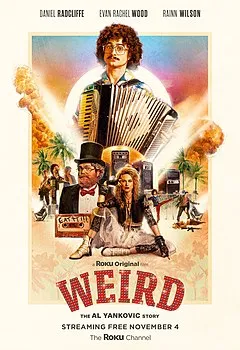Historical accuracy of Weird: The Al Yankovic Story

Historical accuracy of Weird: The Al Yankovic Story

Characters
Weird Al Yankovic
Yankovic is a real musician known for parodies and the accordion. However, the film intentionally portrays a fictionalized version – depicting him as brooding, rebellious, action hero, alcoholic – wildly diverging from his actual personality and life story for satire.
Madonna
Madonna is a real pop star. However, the film's depiction of her having a passionate, destructive affair with Yankovic, pushing him towards danger, and connection to Escobar is entirely fictional and satirical. They never dated.
Dr. Demento (Barry Hansen)
Dr. Demento is a real radio personality who was crucial in launching Yankovic's career by playing his early tapes (True). The film exaggerates his persona and the context of their interactions for comedic effect (Partly historic portrayal).
Nick Yankovic
Al's father was real (True). His portrayal as violently opposed to the accordion and parody music, blaming it for industrial accidents, is a complete satirical fabrication (False portrayal). The real Nick Yankovic bought Al his first accordion.
Mary Yankovic
Al's mother was real (True). Her portrayal as somewhat supportive but subservient to Nick's anti-accordion stance is part of the fictional family dynamic created for the film (False portrayal).
Pablo Escobar
Escobar was a real drug lord. His entire involvement in the plot – being a devoted fan, kidnapping Madonna, being killed by Yankovic – is an absurd, completely fictional satirical element (False plot involvement).
More characters
Ben Scotti
Ben Scotti co-ran Scotti Brothers Records, Yankovic's long-time label. His existence and role are historical context.
Tony Scotti
Tony Scotti co-ran Scotti Brothers Records. His existence and role are historical context.
Wolfman Jack
Real radio personality, included in the fictional pool party scene.
Divine
Real performer, included in the fictional pool party scene.
Pee-wee Herman
Real comedian (Paul Reubens), included in the fictional pool party scene.
Salvador Dalí
Real artist, absurdly included in the fictional pool party scene for comedic effect.
Andy Warhol
Real artist, absurdly included in the fictional pool party scene for comedic effect.
Jon "Bermuda" Schwartz
Real band member, portrayed briefly.
Story
Father's extreme opposition to accordion/parody
Entirely fabricated for comedic effect, satirizing disapproving parent tropes in biopics. Al's real parents were supportive.
Al inspired at a teenage polka party
Completely fictional scene used to satirize the "moment of inspiration" trope.
Writing "My Bologna" based on "My Sharona"
Yankovic did record "My Bologna" (parody of "My Sharona") in a bathroom stall at college (True), but the specific circumstances and reaction depicted are exaggerated for comedy (Partly true context).
Discovery by Dr. Demento via tape submission
Yankovic did gain initial exposure by sending tapes to Dr. Demento's radio show, which Demento played.
Instant mega-stardom / Becoming rock icon
Yankovic achieved significant success, but the film portrays his rise with satirical exaggeration, skipping nuances and depicting an unrealistic level of immediate rock-god status.
Pressure to write parodies instead of originals
Yankovic is known primarily for parodies; the film reverses this, satirizing artists who "sell out," by pretending he was forced into parodies against his artistic desire to write originals.
Passionate love affair with Madonna
Completely fabricated for satirical purposes. Yankovic and Madonna have never dated.
Madonna suggesting parody of "Like a Virgin" ("Like a Surgeon")
Yankovic conceived the idea for "Like a Surgeon" independently; Madonna did not suggest it to him as part of a manipulative relationship.
Al's descent into alcoholism / bad behavior
Fabricated storyline parodying the "rockstar meltdown" trope. Yankovic is famously clean-living (no drugs/alcohol) and controversy-averse in real life.
Battle against Pablo Escobar in Colombia
Entirely fictional, absurd action sequence created for the parody.
Winning fictional award / Assassination attempt
Completely fabricated ending satirizing tragic biopic conclusions. Yankovic is alive and well.
Parody of "Eat It" being an original, "Beat It" the parody
A direct reversal of reality for comedic effect, part of the satire on originality vs. parody.
Film presented as explicitly factual and true
The film's framing as a "true" story is part of the overarching satire of the biopic genre's often dubious claims to accuracy.
Setting
Suburban California Childhood (1960s/70s)
Visually represents the typical suburban setting of Yankovic's youth, fitting the era aesthetically, even if the events depicted are fictional.
College campus environment
Represents a typical college setting where Yankovic attended (Cal Poly, though not explicitly detailed).
Dr. Demento Radio Show / Studio
Visually evokes the atmosphere of a quirky, independent radio show studio appropriate for the era.
1980s Music Industry (Record Companies, Concerts, Awards)
Captures the visual style (fashion, decor) and general atmosphere associated with the music industry, concert venues, and awards shows during the peak of Yankovic's initial fame in the 1980s.
Celebrity Pool Party setting
While the specific gathering is fictional, the setting visually represents the decadent party scene associated with music/comedy circles in the 70s/80s, populated by real (though anachronistic) figures.
Fictional Colombian Jungle / Escobar Compound
This setting exists only within the film's fabricated action plot involving Pablo Escobar.
1970s/1980s Period Aesthetics
The film effectively uses costumes, hairstyles, cars, set design, and music cues to establish the visual and auditory feel of the relevant decades.
Recording Studio settings
Visually represents typical recording studio environments of the era where Yankovic would have worked.
